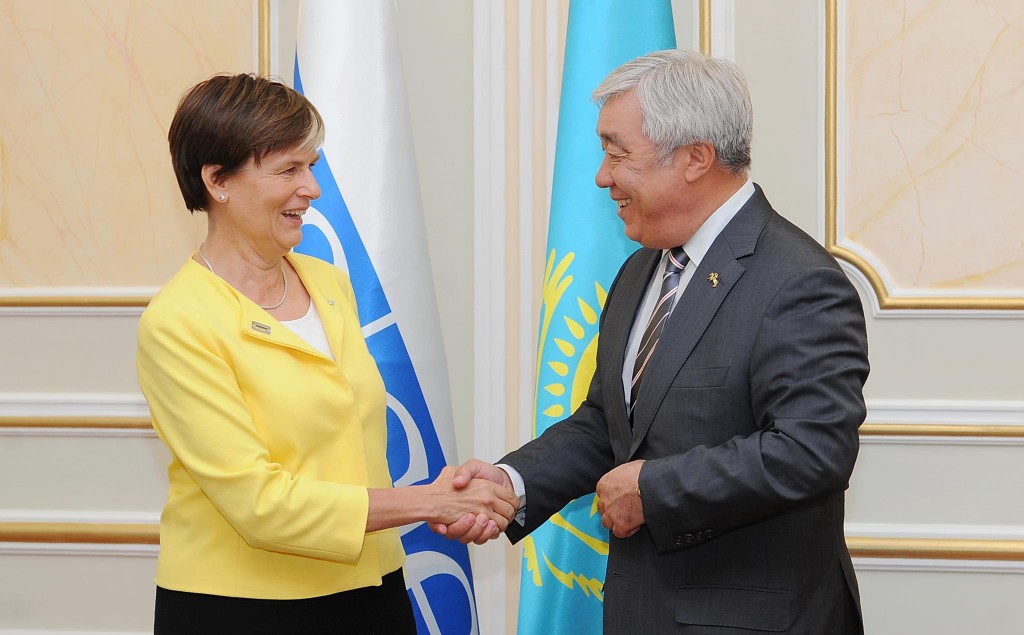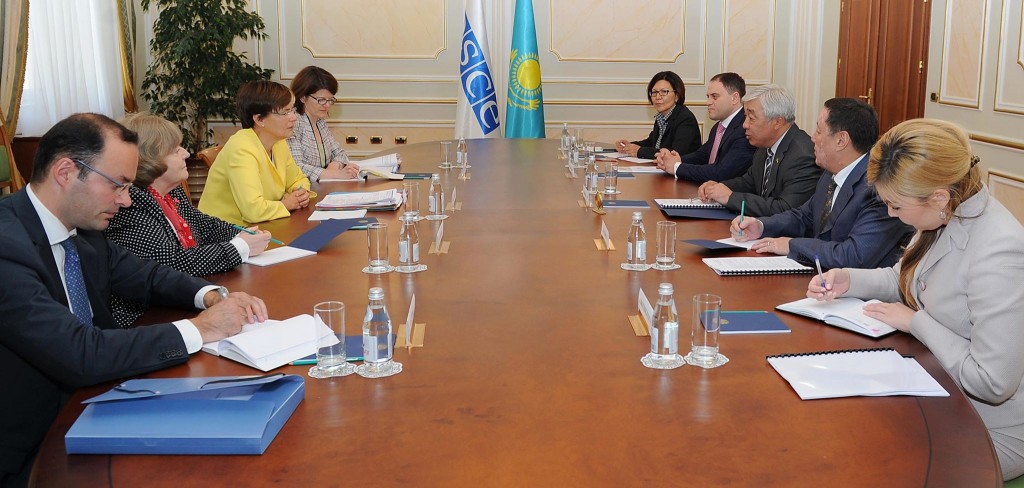ASTANA – Organisation for Security and Cooperation in Europe (OSCE) High Commissioner on National Minorities (HCNM) Astrid Thors travelled to Astana to participate in the conference dedicated to the 20thanniversary of the Assembly of People of Kazakhstan (APK).
During her visit, she held a meeting June 15 with Kazakh Foreign Minister Erlan Idrissov where theydiscussed the state and prospects of cooperation between her office and the nation.
Idrissov underlinedthe tripprovidedThorswith an opportunity to receive up-to-date information about the country’s achievements in building a tolerant and multicultural society and identify new opportunities to enhance the activities of the OSCE programme office in Kazakhstan. He noted the country has managed to successfully confront the financial crisis, join the 50 most competitive economies in the world and build its own model of socio-economic development.
“The results of these efforts helped to launch the Kazakhstan 2050 development strategy and the Nurly Zhol economic programme , the main aim of which is to get to the 30 developed countries in the world,” he said.
The foreign minister noted the atmosphere of tolerance and harmony in Kazakhstan has become the hallmark of the country. The progress in socio-economic development was achieved thanks to interethnic peace and religious harmony, the top priorities of President Nursultan Nazarbayev’s policy.
Idrissov added that the key feature of Kazakhstan’s policy is the understanding of the term “tolerance” not only as “tolerance toward others,” but as “tolerance plus,” including respect for others and ensuring mutual enrichment from the peaceful co-existence and development on this basis.
In turn, Thors said she appreciated the steps the Kazakh governmentis taking to further ensure economic and social development, as well as measures to modernise the country, including the implementation of the five institutional reforms and 100 concrete steps of the Plan of the Nation. She stressed that today the stability of international relations and friendship are as important as ever for the OSCE. She also noted the importance of the fifth Congress of Leaders of World and Traditional Religions on June 10-11 in strengthening the atmosphere of dialogue at the international level.
The two sides noted the importance of keeping the policy of interethnic consent in Kazakhstan, as well as an exchange of experience with OSCE in this sensitive area.
The same day, Thors met in the Kazakh National Library with Deputy Chairman and Head of the APK Secretariat Yeraly Tugzhanov. He reported on the implementation of the national action plan on organisation and holding the Year of the APK. They also exchanged views on further development of the state’s ethnic policy.
According to the official OSCE website, the HCNM becomes involved in a situation if, in her judgement, there are tensions involving national minorities which could develop into a conflict. Much of the day-to-day work is in identifying and addressing causes of ethnic tensions and conflicts. The high commissioner addresses the short-term triggers of interethnic tension or conflict and long-term structural concerns. If a participating state is not meeting its political commitments or international norms, she will assist by providing analysis and recommendations. Based on experience, the HCNM publishes thematic recommendations and guidelines that give advice on common challenges and best practices. The high commissioner also provides structural support through small collaborative projects that aim to achieve sustainability through increasing local ownership.
A native of Finland, Thors began her mandate on August 20, 2013. She was a member of Finnish Parliament from 2004-2013, served as Minister of Migration and European Affairs (2007–2011) and was a member of the European Parliament (1996–2004).
The HCNM’s mandate states that the high commissioner should be an eminent international personality with long-standing relevant experience from whom an impartial performance of the function may be expected. The mandate draws heavily on the judgement, experience and political and diplomatic sense of the appointed person. As such, the acquired reputation and personal traits of the high commissioner are vitally important.

